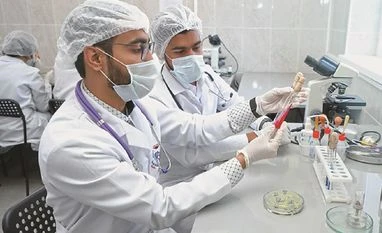A notification for revising Schedule M (of the Drugs and Cosmetics Rules, 1945) may be released soon to help Indian pharma companies adopt good manufacturing practices (GMP) as prescribed by the World Health Organization (WHO), a senior government official said.
The Drugs Controller General of India (DCGI), Rajiv Singh Raghuvanshi, said at a conference revised Schedule M would bring the industry on a par with global standards.
The move has come after the WHO raised concern when cough syrups exported by some Indian companies were allegedly responsible for the deaths of children abroad.
Adopting GMP in accordance with revised Schedule M was made mandatory for all pharma companies, including micro, small and medium companies, last month. Manufacturers having an annual turnover of less than Rs 250 crore had to complete their certification process within 12 months, whereas those with over Rs 250 crore were given six months to do so.
The draft rules, still under consideration, include provisions to strengthen quality control and the safety of drugs manufactured in India.
Meanwhile, to explain these changes and ensure compliance with them, the Central Drugs Standard Control Organisation (CDSCO) has conducted a one-day workshop in Mumbai.
Eswara Reddy, joint drug controller, CDSCO, said one of the most important changes proposed in the new draft rules was introducing a comprehensive system for change control.
“Under the current rules, manufacturers are only required to notify the CDSCO of significant changes to their manufacturing processes. The new draft rules would require manufacturers to classify all changes as minor, major, or critical, and to implement appropriate controls for each type of change. This would help to ensure that any changes in manufacturing processes are evaluated and managed to minimise the risk of product contamination or quality problems,” Reddy said.
The revision introduces the pharmaceutical quality system, quality risk management, product quality review, and qualifying and validating equipment, change control management, self-inspection, and stability studies in accordance with recommended climate conditions. Another important change proposed in the new draft rules is that manufacturers need to have a qualified and validated computerised storage system for all drug products, ensuring that drugs are stored in right conditions and that their quality is maintained throughout the supply chain. The draft rules also introduce validated cleaning procedures, working standards, and identity tests for starting materials. Additionally, they extend the retesting period for materials and call for including weighing areas, audit trails, and measures to prevent cross-contamination. Detailed guidelines for good production practices, deviation control, and equipment storage after cleaning have also been incorporated.
The ongoing risk-based inspections might have prompted the government to reassess the current GMP regulations and quality management systems followed by pharmaceutical manufacturers.
GMP, which include standards for materials, methods, machines, processes, personnel, and facilities, was first introduced in 1988 under Schedule M. This is the first amendment since June 2005.
The government has been trying to implement regulatory reforms in the pharma sector for the past few months. This includes regular meetings with state controllers to ensure harmonisation in the workings of the departments. Highlighting India’s desire to be a permanent member of the International Council for Harmonisation of Technical Requirements for Pharmaceuticals for Human Use, the DCGI said: “We have been accorded observer status but the ball is in their court as far as inviting us for membership is concerned.”
The DCGI said 99 per cent of the spurious products found during the past two to three years were among the top 300 medicine brands in India.
To counter this, the CDSCO will develop a digital regulatory ecosystem to look into grievances and impacts caused by the spurious industry.
The CDSCO has raided several labs that made spurious medicines.
Proposed changes
Pharmaceutical quality system
Quality risk management
Product quality review
Qualification and validation of equipment
Computerised storage system for all drug products
Unlock 30+ premium stories daily hand-picked by our editors, across devices on browser and app.
Pick your 5 favourite companies, get a daily email with all news updates on them.
Full access to our intuitive epaper - clip, save, share articles from any device; newspaper archives from 2006.
Preferential invites to Business Standard events.
Curated newsletters on markets, personal finance, policy & politics, start-ups, technology, and more.
)